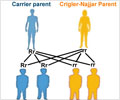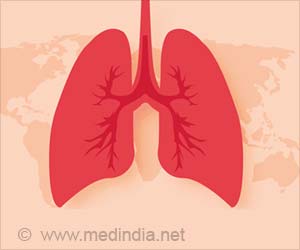A genetic mutation in a gene that is a marker for asthma severity may also play a role in causing the disease.
A genetic mutation in a gene that is a marker for asthma severity may also play a role in causing the disease, researchers at Yale School of Medicine and the University of Chicago report today in the New England Journal of Medicine.
“We know from a recent study that people with severe asthma are more likely to have elevated levels of the protein known as YKL-40 in their blood compared to people without asthma,” said Geoffrey Chupp, M.D., associate professor of medicine at Yale and senior author of the study. “In this study we found that a mutation in the YKL-40 gene is associated with YKL-40 levels in the blood, a diagnosis of asthma, and impaired lung function. Ultimately, blocking the effects of YKL-40 may prove to be a novel and effective way to treat asthma.”Asthma is a chronic respiratory disease characterized by airway inflammation, airway obstruction, and episodes of respiratory difficulty. As of five years ago, 20 million people in the United States had a diagnosis of asthma.
YKL-40, which may have originally evolved to help protect the airways, is what is known as a chitinase-like protein. It attaches itself to chitin, a substance found in fungi, crustaceans, and insects like dust mites and cockroaches. Humans don’t manufacture chitin but produce enzymes that either break down or bind to chitin.
Carole Ober, first author of the article and an expert in asthma genetics at the University of Chicago, correlated YKL-40 levels with variations in the human genome in a group of 632 individuals from South Dakota. This population is genetically homogeneous, so identifying genetic links to disease can be easier than in larger populations where a lot of genetic mixing has occurred.
The members of this particular group were related to each other through multiple lines of descent in a 3,028-person, 13-generation pedigree, which is like a family tree, with 62 founders. “The small number of founding genomes reduces genetic differences and their communal lifestyle ensure that non-genetic factors are uniform among individuals,” the researchers said.
Ober’s team found that one of the mutations in the YKL-40 gene also correlated with a diagnosis of asthma and with impaired lung function, suggesting that increased levels of YKL-40 are part of the causal pathway that leads to asthma.
Advertisement
Source-YALE University
SRM/L











